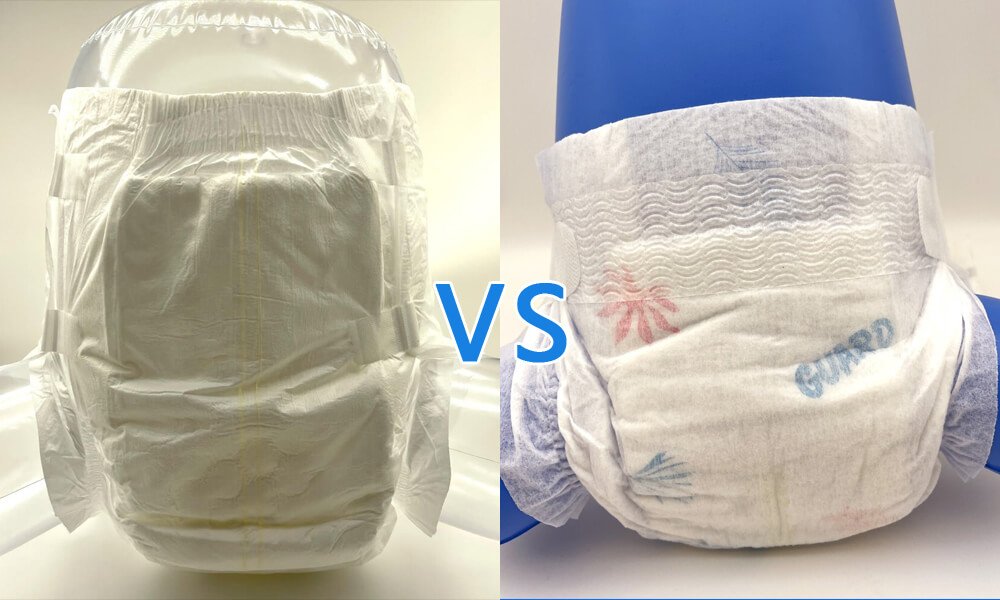Dans le domaine des produits d'hygiène personnelle, les couches pour adultes et pour bébés remplissent la fonction indispensable de gestion des déchets corporels. Cette section introductive se penche sur l'essence des couches, en soulignant leurs objectifs principaux et en préparant le terrain pour une comparaison nuancée entre les serviettes hygiéniques pour hommes et les couches pour bébés.
Les couches, fondamentalement conçues pour absorber et contenir l'urine et les matières fécales, conviennent aux personnes de tous âges. Elles atténuent les inconvénients liés à l'incontinence et assurent un semblant de normalité dans la vie quotidienne.
Pour les bébés, les couches sont essentielles pendant les premières années de la vie, facilitant la transition entre la petite enfance et l'apprentissage de la propreté. Chez les adultes, en particulier les hommes, les serviettes hygiéniques répondent à des problèmes tels que l'incontinence urinaire, les soins post-opératoires ou d'autres problèmes de santé nécessitant leur utilisation.
La comparaison entre ces deux types de couches met en lumière la conception spécialisée et la fonctionnalité adaptées aux besoins uniques de chaque groupe d'âge, jetant ainsi les bases d'une analyse approfondie.
1. Conception et structure : Adaptés aux différents besoins
La conception et la structure des couches sont essentielles, car elles sont façonnées par les exigences anatomiques et physiologiques de l'utilisateur.
Considérations anatomiques
Les protège-couches pour hommes sont conçus en fonction de l'anatomie masculine et offrent une absorption ciblée au niveau de la zone frontale. À l'inverse, les couches pour bébés sont conçues pour s'adapter à la croissance rapide et aux mouvements actifs des enfants.
Composition du matériau
Le choix des matériaux utilisés dans la fabrication des couches influe considérablement sur le confort et l'efficacité. Les fabricants utilisent différents tissus et matériaux absorbants pour optimiser les performances, les couches pour adultes nécessitant souvent des composants plus solides et plus durables.
Taille et ajustement
La taille et l'ajustement sont essentiels pour éviter les fuites et assurer le confort. Les couches pour adultes se déclinent en plusieurs tailles pour s'adapter aux différentes morphologies, tandis que les couches pour bébés sont classées en fonction de l'âge et du poids, offrant un ajustement parfait à chaque étape de la croissance.
2. Absorption et protection contre les fuites
Une absorption efficace et une protection contre les fuites sont essentielles pour maintenir l'hygiène et le confort.
Capacité d'absorption
L'essentiel de la fonctionnalité d'une couche réside dans sa capacité d'absorption. Les couches pour adultes ont généralement un niveau d'absorption plus élevé pour gérer des volumes de déchets plus importants, ce qui reflète les différences physiologiques entre les adultes et les enfants en bas âge.
Technologie de base
La technologie de base innovante des couches comprend des polymères superabsorbants qui retiennent l'humidité, réduisant ainsi considérablement le risque de fuites et d'irritation de la peau.
Barrières anti-fuites
Les deux types de couches intègrent des barrières anti-fuites, mais leur conception varie pour répondre aux besoins spécifiques de l'utilisateur. Les couches pour adultes sont souvent dotées de barrières plus hautes ou de protections pour éviter les fuites latérales, ce qui est particulièrement important pendant le sommeil ou l'activité physique.
3. Confort et portabilité
Le confort et la facilité de port sont primordiaux pour les utilisateurs, car ils influencent la satisfaction générale et la qualité de vie.
Douceur et texture
La douceur et la texture du matériau de la couche sont essentielles pour éviter les frottements et les irritations. Les tissus doux pour la peau sont une priorité, en particulier pour les personnes à la peau sensible ou qui utilisent la couche à long terme.
Élasticité et adaptabilité
L'élasticité et l'ajustabilité des couches garantissent un ajustement sûr, permettant les mouvements sans compromettre la protection. Les couches pour adultes, en particulier, peuvent être munies de languettes ou de ceintures réglables pour un ajustement personnalisé.
Respirabilité
Les matériaux respirants sont essentiels pour éviter l'accumulation de chaleur et d'humidité, réduisant ainsi le risque d'infections cutanées et d'inconfort. Cette caractéristique est bien prise en compte dans les couches pour adultes et pour bébés.
4. Matériaux et sensibilité de la peau
Les couches doivent être hypoallergéniques et non irritantes pour protéger la peau contre les sensibilités et les allergies. Les changes pour hommes sont souvent formulés avec de l'aloès ou d'autres agents apaisants pour la peau afin d'éviter les irritations. En revanche, les couches pour bébés privilégient les matériaux doux pour préserver la peau délicate des nourrissons.
Indicateurs d'humidité et fréquence des changements
Les indicateurs d'humidité, une caractéristique commune aux couches pour adultes et pour bébés, fournissent un repère visuel pour savoir quand un changement est nécessaire, ce qui contribue à maintenir la santé et le confort de la peau. La fréquence des changes est également adaptée aux besoins de l'utilisateur, les adultes nécessitant moins de changes que les bébés mais ayant des besoins d'absorption plus importants.
Caractéristiques hygiéniques
Des caractéristiques hygiéniques avancées, telles que les technologies antimicrobiennes et de contrôle des odeurs, sont intégrées dans les couches pour améliorer la santé de la peau et le confort de l'utilisateur. Ces caractéristiques sont particulièrement importantes dans les couches pour adultes afin de gérer les effets d'une durée d'utilisation plus longue et de préserver la dignité et la fraîcheur.
5. Scénarios d'utilisation et adaptation du mode de vie
Les couches doivent s'aligner sur le mode de vie de l'utilisateur, en offrant un soutien adéquat pour les différentes activités et routines.
Routines et activités quotidiennes
La conception des protège-couches pour hommes tient compte des activités quotidiennes de l'utilisateur et garantit que le produit peut supporter différents niveaux de stress, qu'il s'agisse d'un mode de vie passif ou actif. Les couches pour bébés, en revanche, sont conçues pour la nature dynamique et imprévisible des mouvements et des activités d'un bébé.
Mobilité et flexibilité
La mobilité et la flexibilité dans la conception des couches sont essentielles pour maintenir un mode de vie actif. Les couches pour adultes offrent des solutions qui s'adaptent aux besoins de mobilité de l'utilisateur, garantissant confort et sécurité lors de diverses activités physiques. Pour les bébés, les couches sont conçues pour maintenir l'ajustement et la protection même en cas de mouvements et de changements de position fréquents.
Discrétion et implications sociales
Pour de nombreux adultes, la discrétion d'une couche-culotte est essentielle pour avoir confiance en soi et participer à la vie sociale. Les couches pour adultes sont donc conçues pour être moins visibles sous les vêtements, alors que les couches pour bébés sont généralement moins concernées par la discrétion en raison de la nature des soins prodigués aux enfants.
6. Considérations environnementales et économiques
Les facteurs environnementaux et économiques jouent un rôle important dans le choix des couches.
Biodégradabilité et durabilité
Les préoccupations environnementales ont conduit à des innovations dans la technologie des couches, en mettant l'accent sur la biodégradabilité et l'utilisation de matériaux durables. Bien que les couches pour adultes et pour bébés fassent l'objet d'un examen minutieux en ce qui concerne leur impact sur l'environnement, le marché tend de plus en plus à proposer des options plus respectueuses de l'environnement.
Rapport coût-efficacité
L'aspect économique de l'utilisation des couches implique d'évaluer le coût par utilisation, en particulier pour les adultes qui peuvent avoir besoin d'une utilisation à long terme. Le rapport coût-efficacité des couches pour bébés est également une considération pour les parents, qui doivent trouver un équilibre entre la qualité et les contraintes budgétaires.
Disponibilité et accessibilité
La facilité d'obtention des couches, que ce soit pour les adultes ou les bébés, influe sur l'expérience de l'utilisateur. La disponibilité dans différents canaux de distribution et la possibilité d'acheter discrètement en ligne jouent un rôle dans le processus de décision, en particulier pour les utilisateurs de couches pour adultes.
7. Innovations et progrès technologiques
L'industrie des couches-culottes continue d'évoluer, avec des innovations visant à améliorer l'expérience de l'utilisateur.
Couches et capteurs intelligents
Les avancées technologiques telles que les couches intelligentes, équipées de capteurs, offrent de nouveaux niveaux de commodité et de surveillance, en alertant les soignants sur la nécessité d'effectuer des changements. Ces innovations apparaissent à la fois sur le marché des couches pour adultes et sur celui des couches pour bébés, améliorant ainsi les soins et la gestion.
Tendances futures de la technologie des couches
L'avenir de la technologie des couches laisse entrevoir une personnalisation et une fonctionnalité encore plus grandes, avec des développements axés sur l'amélioration de l'absorption, du confort et de l'impact sur l'environnement.
Impact sur l'expérience de l'utilisateur
Ces avancées technologiques ont un impact significatif sur l'expérience de l'utilisateur, offrant un meilleur confort, une meilleure santé de la peau et une gestion plus efficace de l'incontinence et de l'hygiène.
8. Conclusion : Choisir la bonne couche
En conclusion, le choix entre les serviettes hygiéniques pour hommes et les couches pour bébés dépend de la compréhension des différences nuancées qui répondent aux besoins spécifiques de chaque groupe démographique.
Résumé des différences
Les différences portent sur la conception, l'absorption, le confort, la compatibilité avec le mode de vie et les considérations environnementales, soulignant l'importance de choisir un produit qui s'aligne sur les besoins et les circonstances de chacun.
Facteurs de décision
Des facteurs tels que le degré d'incontinence, le mode de vie, la sensibilité de la peau et les valeurs environnementales influencent la décision, guidant les utilisateurs vers la solution de couches la plus appropriée.
Recommandations finales
Pour faire un choix éclairé, il faut peser ces facteurs, l'objectif ultime étant de trouver une couche qui offre le meilleur équilibre entre confort, fonctionnalité et dignité pour l'utilisateur, qu'il s'agisse d'un homme adulte ou d'un enfant en bas âge.

